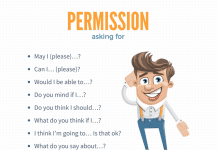
As you may remember from last lesson, I was telling you all about how to become as fluent as possible in speaking English.
I emphasised that you should “forget grammar”…in other words, learn “chunks” of natural speech instead of focusing on grammar rules, if you would like to improve your conversational skills.
Skype English Lesson with a native AMERICAN or BRITISH teacher ››
Read more:
How to Speak English Fluently – 2 Unusual Tips
So, to continue with this theory, what happens when you are able to make fluid conversation? Are you satisfied?
Well, some of you are but others are not. Why? Because they then become concerned with their accent, they feel that they have a pronounced mother tongue accent that marks them out as being a non-native speaker, or they worry that their natural accented English speech is unintelligible to others.
Why is this a ‘problem’?
For some of you, the answer is that it’s not, they are perfectly happy with having a recognisable national accent to their English. Indeed, as the numbers of non-native speakers of English outnumber native speakers, and the fact that most speech acts in English take place between non-natives, most people don’t consider it a problem at all.
For others who, for instance, may be struggling to find or keep employment within a multinational company, or who may work in a job that involves international communication (such as call centres) where their accented English may make communication difficult, it could well be a major issue.
To give an illustration of what I mean, one of the biggest demands for accent reduction lessons now comes from India. This is due to the outsourcing of call-centre jobs to India, and the subsequent failure by some nationalities (namely Americans!) to understand them, which has led to the demand for accent reduction.
Read more:
7 Wonderful Websites That Will Help You Improve Your Pronunciation
Now before continuing, I have to point out that it is very difficult to completely change your own accent to that of another nationality. So, it is very hard for an Indian, for example, to sound like an Englishman with a typical “BBC” standard pronunciation, or even an American.
The minority who could probably prove me wrong, are of course, actors. Some can only temporarily adopt another accent, for others the effect is rarely permanent. Plus, there are the lucky ones who just have a knack for languages and can pick up a foreign tongue really easily, but for most of us it’s not so straightforward!
So, what we mean by accent reduction is accent neutralisation, where your accent is changed in a small way to sound more like a native English or American person’s pronunciation.
Skype English Lesson with a native AMERICAN or BRITISH teacher ››
Read more:
Difference between ACCENT and DIALECT
Now you may well be thinking, how does this apply to me? How can I “neutralise” my own accent?
The answer is that it is not easy to do on your own.
What you can do by yourself is to choose a ‘target’ accent, the national pronunciation you like best, whether American or British English for example.
Then you need to analyse your own accent, usually by recording your own voice and comparing it with your ‘target’ accent, and then identify the differences and try to correct them. Some useful sources of information can be found by listening to the BBC world service.
This is a really good site because it has lots of useful accent and pronunciation tips, as well as free downloadable materials of both audio and text files to help you.
Read more:
Which Accent is More Popular British or American
Another very useful pronunciation tool is the downloadable audio phonetic chart from the British Council, this is an app which you can install on your iPhone or PC and it plays the sounds of the 44 phonemes in the English language which you can then imitate.
If you need more examples of different accents in English then you can try IDEA (International Dialects of English Archive) and GMU (George Mason University)
They both have a searchable index of different regional and national accent along with a transcript in most cases for you to listen to and imitate. These websites will give you lots of examples of the different accents that people have, so you can find one you like and try to imitate it.
Skype English Lesson with a native AMERICAN or BRITISH teacher ››
Read more:
What are the main differences between American and British English?
I have to be honest here and say that if you are serious about neutralising your accent, you really need the help and guidance of someone who knows what they are doing.
A good first step would be to find a suitably qualified native English teacher with experience in this area, like our staff at MyEnglishTeacher.eu.
The reason for this is obvious; you need someone who is familiar with the phonetic system of the English language and who has an extensive knowledge of how the “natural” mechanics of speech (rhythm, tone, and stress) work, and who knows how to teach them.
Read more:
Book a lesson with an American, British or Australian English!
So, not just any ‘native’ speaker will do, you need an expert language teacher who has the knowledge and experience to assist you.
The other reason is that it is very difficult to analyse your own speech, not impossible by any means, but best done by someone who knows their business.
I hope this helps, or gives you an idea about what to do to change your accent…good luck!




























